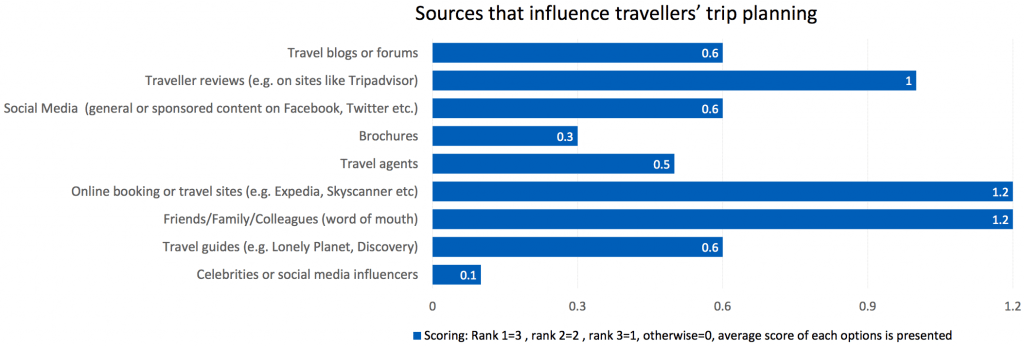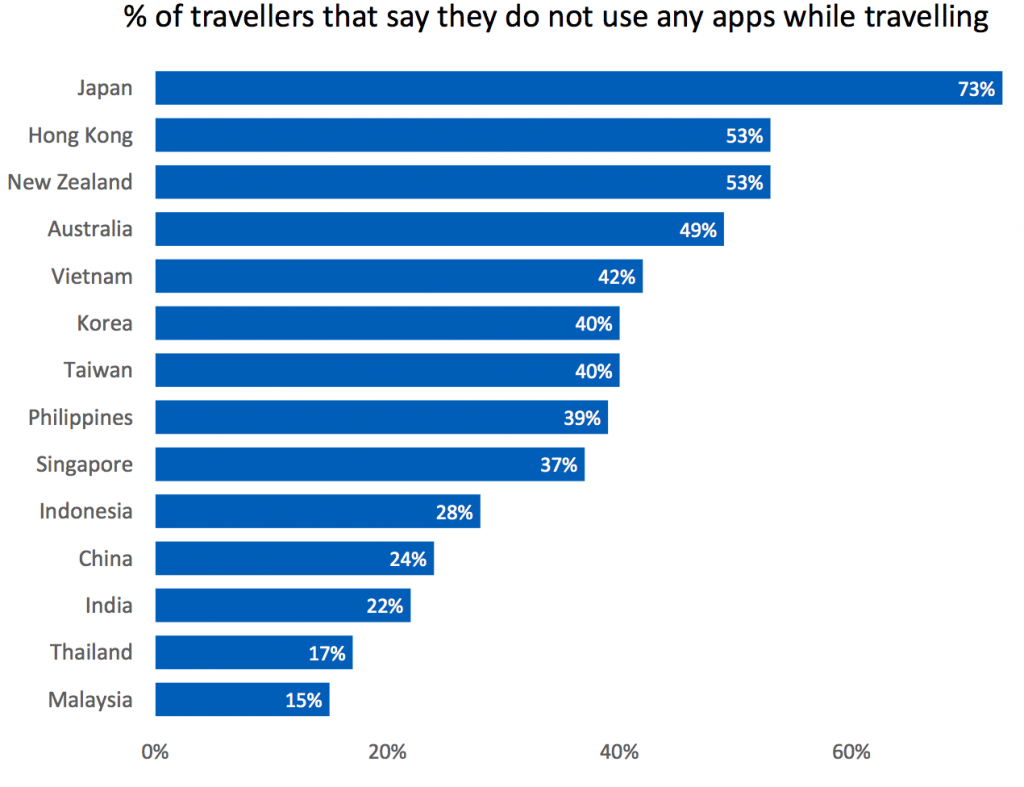Skift Take
There is a ton of variation in the behavior of travelers from different countries across the Asia-Pacific region. Travel companies should pay more attention to the specific needs of the travelers they're trying to reach.
Asia represents one of the fastest-growing regions for the travel industry, yet concrete insights into the behavior of these travelers has been hard to come by.
Amadeus partnered with YouGov to survey 6,870 adults across the Asia-Pacific region who traveled internationally in the last year about their preferences and habits.
Among the more interesting findings from the report was that influencers have little influence in Asia-Pacific travelers’ trip-planning decisions. Word-of-mouth and online reviews are the most important factors.
Amadeus and YouGov’s findings, published in a report titled Journey of Me Insights: What Asia-Pacific Travelers Want, show that many travelers from the region want personalized recommendations and suggestions from travel brands.
About two-in-three travelers polled, 64 percent, said they would share personal information in exchange for offers and personalized experiences. But there were big differences depending on the nationality of the traveler; while 80 percent of Indonesians were open to sharing personal information, just 31 percent of Japanese travelers were open to sharing.
The report as a whole shows the need for travel companies and marketers to pay attention to specific markets in Asia-Pacific instead of approaching travelers across the region in just one way.
“Travelers are the bedrock of travel, and there is no traveller today quite as important as the Asia-Pacific traveler,” said Albert Pozo, president of Amadeus Asia Pacific, in a statement. “Yet the irony is that even as we talk about the ‘Asia-Pacific traveler’ – it doesn’t exist. The diversity we see across nationalities, gender and generation in this region is astounding. More than that, our research has showed us that the preferences, behaviors and demands of travelers vary enormously from one country to another. The industry must come to grips with this. The one-size-fits-all approach is a thing of the past.”
Here are three more insights from the report.
Laptop and Desktop Still Rule
There’s been a large focus lately on how travelers across Asia, particularly in China, have embraced mobile apps. But the evidence from the Amadeus report shows that traditional laptop and desktop devices remain the most popular way to book.
“More Indonesians research trips on mobile (69 percent) and book through mobile (62 percent) than on laptops or desktops (60 percent and 56 percent respectively),” states the report. “Chinese travelers show the highest preference for booking trips through mobile (66 percent) compared to all other travelers. In Australia, Japan, New Zealand the gaps between laptop/desktop and mobile are the largest, with 78 to 92 percent choosing the former compared to 11 to 33 percent for the latter.”
Nobody Cares About Influencers
Travelers from Asia-Pacific countries are fairly traditional when it comes to planning a trip; word-of-mouth recommendations and online reviews are the most important factors, while brochures and influencer endorsements are least impactful.
Thai travelers, interestingly, are the most affected by social media channels when it comes to trip planning.
Some Travelers Use Mobile More Than Others
The popularity of mobile apps across Asia, particularly apps for social networking, is well-known. But usage while traveling varies widely depending on nationality.
Additionally, the vast majority use Wi-Fi to connect to the Internet when abroad instead of mobile data.
“Most respondents from Asia-Pacific use Wi-Fi (71 percent) to stay connected when they are traveling abroad,” concludes the report. “Respondents from Korea have a high preference towards using international roam-as-you-go services (56 percent) whilst respondents from Malaysia, Indonesia and Singapore prefer to use a local sim card purchased at the destination (54 percent, 58 percent, 56 percent respectively).”
You can read the full report below.
The Daily Newsletter
Our daily coverage of the global travel industry. Written by editors and analysts from across Skift’s brands.
Have a confidential tip for Skift? Get in touch
Tags: amadeus, asia pacific, china outbound, influencers
Photo credit: Influencers have little influence in Asia-Pacific travelers' trip-planning decisions. Foreign tourists wearing traditional Japanese kimonos rest on a bench in front of a Japanese confectionary store near Sensoji Temple in Tokyo. 153966 / 153966


